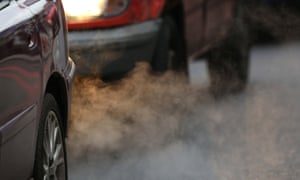Boss of carmaker that cheated on tests of toxic NOx emissions downplays impact of scandal and says diesel vehicles needed to reduce CO2 levels

Taking too many diesel cars off the road because they have been blamed for Europe’s air pollution problems would risk the industry missing its climate change targets, the boss of Volkswagen UK has warned.
Last year it emerged that Volkswagen had cheated on tests for emissions of nitrogen oxides (chemical name NOx), the name for the toxic gases nitric oxide (NO) and nitrogen dioxide (chemical name NO2), both of which are found in diesel fumes. Paul Willis, managing director of VW UK, told MPs on Wednesday that tackling NO2 emissions could come at the expense of cutting carbon dioxide (CO2) emissions from cars – the greenhouse gas seen as a major contributor to climate change.
NO2 is responsible for nearly 6,000 annual premature deaths in London, parts of which breached annual limits last week.
“I would say that unless we have a significant diesel mix in Europe, within our fleet, we will miss that target, not VW, the industry will miss that [CO2] target,” said Willis, referring to the EU target of an average new car emitting 95g CO2 per kilometre by 2021, compared to an average of 123.4g CO2 per km in 2014.
Transport is responsible for around a quarter of European Union greenhouse gas emissions, so moves to cut them are seen as vital to climate change efforts.

Facebook Twitter Pinterest
During an often heated exchange with environment, food and rural affairs committee MPs, Willis defended VW’s environmental record but conceded the company had to win back consumer trust after the revelations last year that 12m of its cars were equipped with “defeat devices” to cheat NOx emissions tests.
“For almost everyone in our company to learn what we learned in September [when the scandal emerged] was very difficult for us to swallow and very difficult for us to understand. I think you heard the apologies I made at that time and I’m still really sorry for that.” He said the company would redouble efforts to win back trust.
But owners of the 1.2m VW cars in the UK affected by the diesel emissions testing scandal should not receive any compensation because they have not suffered any loss, he argued. “To pay compensation, there has to be a loss. At this stage I see no reason for there to be a loss. The adjustment of the software, our engineers are telling us, there will be no difference in in fuel consumption as a result of this fix.
“The other area is on the question of residual values, I have seen no clear evidence there has been any adverse impact on residual values.”
A survey last year found that nine out of 10 VW drivers in Britain affected by the scandal believed they should receive compensation, in addition to the software fix that VW is rolling out to customers.
Asked whether consumers would begin to factor health into their purchasing decisions, Willis said that pollution emissions were not a priority for most car-buyers.
“I’m sorry to tell you but look at the data and look at what customers’ priorities are when they’re buying vehicles, they don’t talk about NOx,” he said.
He said the scandal had had some effect on its sales in November and December but noted that retail orders in December 2015 were actually higher than orders in December 2014. “I think people know there was an error in the testing regime, and they understand in the real world there was no difference at all,” he said.
Asked how much more NO2 had been emitted as a result of his company cheating on the tests, Willis repeated previous assertions that it was impossible to say because there is no agreed standard for “real world” emissions.
Mike Hawes, chief executive of the Society of Motor Manufacturers and Traders, sitting next to Willis, said the technology for testing real world emissions had only been available for two to three years.
Separately on Wednesday, VW’s chief executive Matthias Müller is meeting regulators in Washington to attempt to reach agreement with US authorities on a solution for the affected cars. On Sunday he appeared to downplay the idea the company had cheated tests, telling NPR it was simply a “technical problem” not an “ethical problem”.

